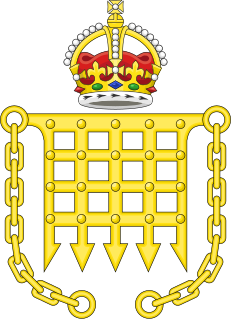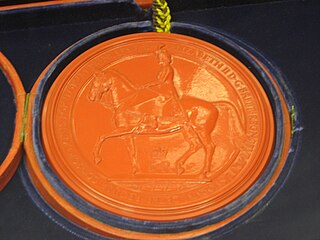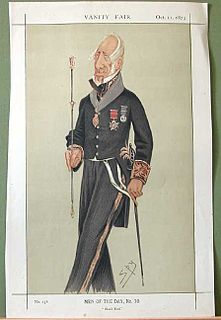
The Gentleman Usher of the Black Rod, or Lady Usher of the Black Rod, generally shortened to Black Rod, is an official in the parliaments of several Commonwealth countries. The position originates in the House of Lords of the Parliament of the United Kingdom.

Earl of Sandwich is a noble title in the Peerage of England and the House of Montagu, nominally associated with Sandwich, Kent. It was created in 1660 for the prominent naval commander Admiral Sir Edward Montagu. He was made Baron Montagu, of St Neots in the County of Huntingdon, and Viscount Hinchingbrooke, at the same time, also in the Peerage of England. The viscountcy is used as the courtesy title by the heir apparent to the earldom. A member of the prominent Montagu family, Lord Sandwich was the son of Sir Sidney Montagu, youngest brother of Henry Montagu, 1st Earl of Manchester, and Edward Montagu, 1st Baron Montagu of Boughton.
A sinecure is an office – carrying a salary or otherwise generating income – that requires or involves little or no responsibility, labour, or active service. The term originated in the medieval church, where it signified a post without any responsibility for the "cure [care] of souls", the regular liturgical and pastoral functions of a cleric, but came to be applied to any post, secular or ecclesiastical, that involved little or no actual work. Sinecures have historically provided a potent tool for governments or monarchs to distribute patronage, while recipients are able to store up titles and easy salaries.

The Lord Steward or Lord Steward of the Household, in England, is an important official of the Royal Household. He is always a peer. Until 1924, he was always a member of the Government. Until 1782, the office was one of considerable political importance and carried Cabinet rank.
Baron Forester, of Willey Park in the County of Shropshire, is a title in the Peerage of the United Kingdom. It was created in 1821 for Cecil Weld-Forester, who had previously represented Wenlock in the House of Commons. Born Cecil Forester, he assumed the additional surname of Weld by royal licence in 1811. His son, the second Baron, also represented Wenlock from 1790 in Parliament, and later served in the Tory administration of Sir Robert Peel as Captain of the Honourable Corps of Gentlemen-at-Arms from 1841 to 1846.
The Office of Works was established in the English Royal household in 1378 to oversee the building of the royal castles and residences. In 1832 it became the Works Department forces within the Office of Woods, Forests, Land Revenues, Works and Buildings. It was reconstituted as a government department in 1851 and became part of the Ministry of Works in 1940.
Henry Fleming Lea Devereux, 14th Viscount Hereford PC was a British Tory politician. He served as Captain of the Honourable Corps of Gentlemen-at-Arms between 1827 and 1830 and again between 1834 and 1835.
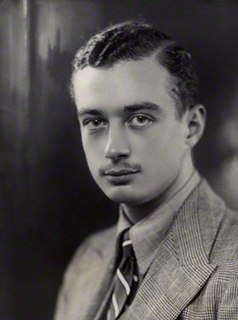
Michael John Hicks Beach, 2nd Earl St Aldwyn was a British Conservative politician. He achieved the distinction of serving in the governments of five different Prime Ministers.

Edward Arthur Colebrooke, 1st Baron Colebrooke,, known as Sir Edward Colebrooke, Bt, from 1890 to 1906, was a British Liberal politician and courtier. He served as Captain of the Honourable Corps of Gentlemen-at-Arms under H. H. Asquith and David Lloyd George between 1911 and 1922.

Charles Douglas Richard Hanbury-Tracy, 4th Baron Sudeley PC FRS, styled The Honourable Charles Hanbury-Tracy from 1858 to 1877, was a British Liberal politician. He served as Captain of the Honourable Corps of Gentlemen-at-Arms under William Ewart Gladstone in 1886.

Charles Gordon, 11th Marquess of Huntly PC, DL, JP, styled Lord Strathavon until 1853 and Earl of Aboyne between 1853 and 1863, was a Scottish Liberal politician. He served under William Ewart Gladstone as Captain of the Honourable Corps of Gentlemen-at-Arms between January and June 1881.
George Berkeley, 1st Earl of Berkeley PC FRS was an English merchant and politician who sat in the House of Commons from 1654 until 1658 when he succeeded to the peerage.
The Diamond Jubilee Honours for the British Empire were announced on 22 June 1897 to celebrate the Diamond Jubilee of Queen Victoria on 20 June 1897.
Arthur Moore M.P. was an Irish businessman, economist and politician who sat in the English and British House of Commons between 1695 and 1722.
The 1902 Coronation Honours were announced on 26 June 1902, the date originally set for the coronation of King Edward VII. The coronation was postponed because the King had been taken ill two days before, but he ordered that the honours list should be published on that day anyway.
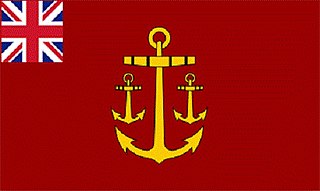
The Controller of Storekeepers Accounts also known as the Comptroller of Storekeepers Accounts was a principle member of the Navy Board who was responsible for managing and processing all naval store-keeping accounts and deliveries to naval yards from 1671 to 1796 he was based in the Navy Office he superintended the Office for Examining Storekeepers Accounts.
Colonel Thomas Moore was an officer of the British Army who served as Paymaster of the Forces Abroad.

The Paymaster of the Marines was established in 1831 following the abolition of Marine Pay Department within the Admiralty that had its own paymaster for the marines. This office holder was part of the Navy Pay Office under the Treasurer of the Navy. The post holder was responsible for processing payments to the Corps of the Royal Marines until the Navy Pay Office was abolished in 1832 as part of reforms of HM Naval Service.
